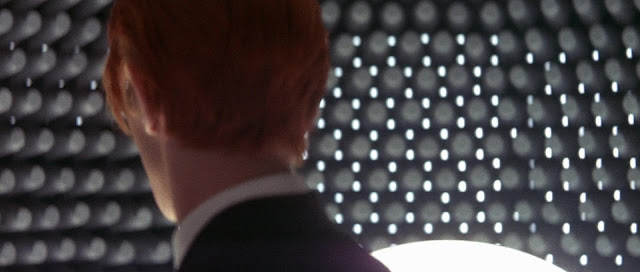USA
written and directed by: Damien Chazelle
starring: Ryan Gosling, Emma Stone, John Legend
seen: 11th August, 2017
My oh my, when was the last time I thought Ryan Gosling might be the most talented leader of his acting generation? It was some good ten years ago and since then he's been picking the most puzzling projects to appear in. His expression completely lost the spectrum and depth of emotion I fell in love with in small art films like "The Believer" or unambicious blockbusters like "Murder by numbers".
Emma Stone, on the other hand, reminded my of a particular sequence from "Mulholland drive". Lynch also presents a struggling actress practising for an audition as his heroine. The viewer sees her in her kitchen with a script in her hand, overacting and overemoting in hopes of being convincing enough. Then she goes to meet the casting director and delivers such a concentrated, mature and intimate performance that everyone's jaws just drop and she gets the role immediately. In my eyes, Emma Stone stays overacting in the kitchen throught the whole La La Land. Maybe it's because she has to sing during most of her emotion-related plot points instead of acting in them. If the director wanted those two proceses to happen simultaneously, maybe he should have hired a performer comfortable with singing as much as with acting because Stone looks like someone who's been training just to imitate singing.
And I also thought that the lovers didn't really click together with ther acting approaches. Stone is being sarcastic and self-doubting while Gosling stays dead serious the whole time. Their shared scenes, even those where they're supposed to be in love with each other, seem to me like nervous conversations between two people who hardly know each other and won't talk about something real or deep out of fear of embarasing themselves. I miss some chemistry and intimacy between them, because elaborate dance numbers shot from afar cannot substitute closeness as a proof of love. And I don't understand the epilogue at all. It seems to show that neither of them grown emotionaly during the five years and that her marriage and motherhood means nothing to her since she would trade it in a second for a fantasy she herself proclaimed unfeasible.
One of the classic musical-related questions is "but normally people don't burst into song and dance, do they?" and this is the film where I'd say the question is relevant. Perhaps if it was a unique way of communication between the two I'd be satisfied, but the film opens with a musical number by a bunch of strangers unrelated to themselves or the story so it only indicates we are about to witness an exercise in futility. Exposition and details moving the story forward are usually revealed in dialogue (and that's my least favourite way of doing so) and all of the other formal whatnot is far from being functional in at least some way. And I am confused as to why are the songs of sadness and displeasure almost the same as the song of joy and exultation.
If I wanted a real actualization of a classical Hollywood musical, I would watch "Dancer in the dark" again. It uses nostalgic admiration with a modern perspective and formal experimenting to come up with something new and radical and the song and dance represent an actual communication amongst the characters (whereas in LLL it's a time filler without another purpose).
If I wanted a film set in a film studio lot that is an educated homage to "the golden age of cinema" actually acknowledging that time has passed betwen the golden age and the world of today, I'd watch the Coen brothers mastepiece "Hail, Caesar!" a hundred times more.
La La Land, as I see it, might work for audiences that ask for nothing else but simple entertainment (and have no genre-specific musical preferences), but it doesn't work for someone acquainted with history of cinema and familiar with a few classic films and a few revisons of said classics as well. Praise it with awards and call it a milestone is misleading at best.
-"How are you gonna be a revolutionary if you're such a traditionalist?"





































